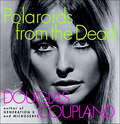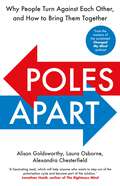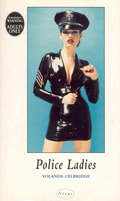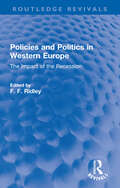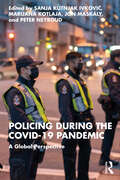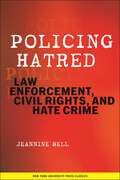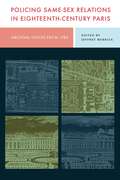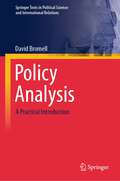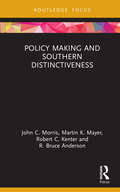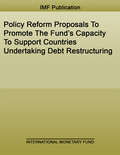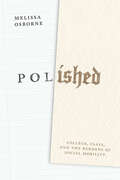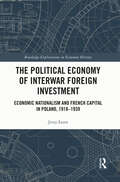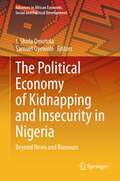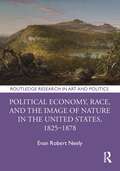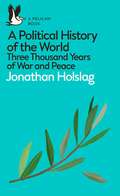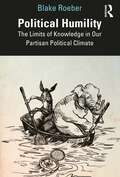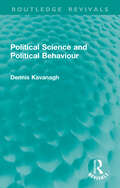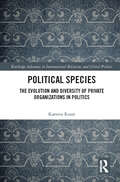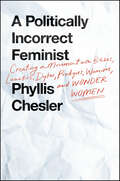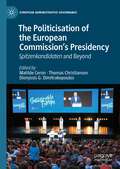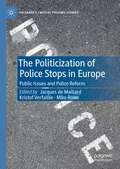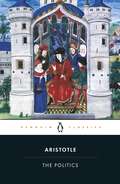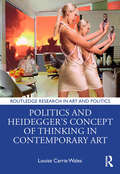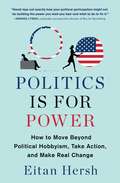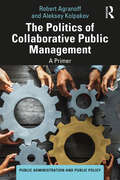- Table View
- List View
Polaroids from the Dead: And Other Short Stories
by Douglas CouplandDouglas Coupland takes his sparkling literary talent in a new direction with this crackling collection of takes on life and death in North America -- from his sweeping portrait of Grateful Dead culture to the deaths of Kurt Cobain, Marilyn Monroe and the middle class.For years, Coupland's razor-sharp insights into what it means to be human in an age of technology have garnered the highest praise from fans and critics alike. At last, Coupland has assembled a wide variety of stories and personal "postcards" about pivotal people and places that have defined our modern lives. Polaroids from the Dead is a skillful combination of stories, fact and fiction -- keen outtakes on life in the late 20th century, exploring the recent past and a society obsessed with celebrity, crime and death. Princess Diana, Nicole Brown Simpson and Madonna are but some of the people scrutinized.
Poles Apart: Why People Turn Against Each Other, and How to Bring Them Together
by Alison Goldsworthy Laura Osborne Alexandra ChesterfieldWhy do people become divided?What steps can we all take to reduce hostility and bring about understanding?Poles Apart has the answers.In Poles Apart, an expert on polarisation, a behavioural scientist and a professional communicator explain why we are so prone to be drawn into rival, often deeply antagonistic factions. They explore the shaping force of our genetic make-up on our fundamental views and the nature of the influences that family, friends and peers exert. They pinpoint the economic and political triggers that tip people from healthy disagreement to dangerous hostility, and the part played by social media in spreading entrenched opinions. And they help us to understand why outlooks that can seem so bizarre and extreme to us seem so eminently sensible to those who hold them.Above all, they show what practical and effective steps we can all take to narrow divisions, build respect for others, and create a greater degree of common understanding.____________________________________________________'Poles Apart is an extraordinary achievement: fresh, deeply authoritative, and entertaining on every page. Everyone talks about polarisation, but no one does it like Goldsworthy, Osborne, and Chesterfield. You'll finish this book wiser, kinder, and more hopeful than when you started it.' Jamie Susskind, author of Future Politics'A fascinating and thought-provoking analysis of the divisions between us, how we bridge them, how we reshape the world - and ourselves too. Essential reading.' Cathy Newman, presenter of Channel 4 News and author'Asks the best question I have ever heard. And, critically, offers solutions. A must read.' Rory Sutherland, Vice Chairman of Ogilvy UK, and author of Alchemy'Technology may have connected the world, but it's now being exploited to divide and polarise us. This is a pivotal moment for this book to be written, read and understood.' Peter Gabriel, musician
Police Ladies
by Yolanda CelbridgeDeep in the Scottish Highlands a curious training academy teaches young women how to pound a beat. Young miscreant Jean Welsh hopes to quell her submissive, promiscuous sexuality by donning their strict uniform. Instruction in the use of restraints, training in the art of flagellation and practical experience in the special use of truncheons characterise the Glenlassie approach to police training - but the recruits are solely being siphoned off by a nearby pony-girl training establishment and a unique medical clinic.
Policies and Politics in Western Europe: The Impact of the Recession (Routledge Revivals)
by F. F. RidleyThe problems of inflation, unemployment and economic stagnation are shared by all industrialised countries, but government response to them varies from state to state. This book, originally published in 1984, examines the effect of the recession of the 1980s on policy-making and policy content in Britain, France, Germany, Italy and Sweden. The author identifies the particular problems that face each country and explains why certain policies were adopted and how recession influenced policy-making. Through comparative analysis, the book shows how each government’s policy-making processes responded to the economic and social pressures created by a crisis in the world economy
Policing during the COVID-19 Pandemic: A Global Perspective
by Sanja Kutnjak Ivković Marijana Kotlaja Jon Maskály Peter NeyroudProviding a global perspective on police adaptations to the COVID-19 pandemic, this book explores the extent of police organizational and operational changes in a number of countries as diverse as Brazil, China, South Africa, South Korea, the Philippines, Russia, the United Kingdom, and the United States. Bringing together a range of international experts, this book reflects on the changes in the broader social environment during the pandemic, examining the contours of police operational and organizational changes across several countries, analyzes the police enforcement of the government COVID-19 rules and regulations, explores the factors related to the COVID-19 effects on police officer wellness and safety, and studies police administrator, police officer, and citizen views about the potential consequences of organizational and operational changes on the interpersonal relations within police agencies and police–community partnerships. Policing During the COVID-19 Pandemic is essential reading for scholars and practitioners interested in exploring the police organizational adaptations, particularly in the times of emergencies, and the societal, cultural, and legal impacts of such adaptations. Sanja Kutnjak Ivković is Professor at the School of Criminal Justice, Michigan State University, USA. She is the Co-Editor of Policing: An International Journal. She is past Chair of the Division of International Criminology, American Society of Criminology, and past Chair of the International Division, Academy of Criminal Justice Sciences. Her co-authored and co-edited books on policing include: Exploring Contemporary Police Challenges, Police Code of Silence in the Times of Change, Police Integrity in South Africa, Exploring Police Integrity, Police Integrity across the World, Enhancing Police Integrity, Fallen Blue Knights, and The Contours of Police Integrity. Marijana Kotlaja is Assistant Professor in the Department of Criminal Justice and Criminology at the University of Missouri-Kansas City, USA. She is involved in evaluation research projects with many organizations, specifically focused on crime and place, and juvenile delinquency. She has led multiple international data collection efforts and has extensive knowledge of advanced quantitative methodology, including structural equation modeling, Bayesian analysis, and hierarchical linear models. She is the Secretary/Treasurer of the Division of International Criminology (American Society of Criminology), as well as the Editor of Around the Globe for the Criminologist. Jon Maskály is Assistant Professor in the Department of Criminal Justice at the University of North Dakota, USA. He won (with co-authors) the 2016 William L. Simon Outstanding Paper award from the Academy of Criminal Justice Sciences. His primary research interests revolve around issues in policing, notably police–community relations, police integrity, and police accountability. He has worked as a subject matter expert in several police reform projects around the nation. He has secured multiple contracts with police organizations to enhance their ability to make data-driven decisions. Peter Neyroud is Associate Professor in Evidence-Based Policing in the Jerry Lee Centre for Experimental Criminology, University of Cambridge, UK. He is the General Editor of the Oxford Journal Policing: A Journal of Policy and Practice. He set up and ran the UK National Policing Improvement Agency. He was commissioned by the UK Home Secretary to carry out a fundamental “Review of Police Leadership and Training,” which led to the establishment of the National “College of Policing.” He is the Co-Chair of the Campbell Collaboration Crime and Justice Coordinating Group.
Policing Hatred: Law Enforcement, Civil Rights, and Hate Crime (Critical America #15)
by Jeannine BellExplores the intersection of race and law enforcement in the controversial area of hate crimeHigh-profile hate crimes like the torture-murder of Matthew Shepard and the dragging death of James Byrd have drawn the nation’s attention, but there are thousands of other individuals who are attacked because of their race, religion, or sexual orientation each year. This study of hate crimes challenges common assumptions regarding perpetrators and victims: most of the accused tend to be white, while most of their victims are not.Policing Hatred is an in-depth ethnographic study of how hate crime law works in practice, from the perspective of those enforcing it. It examines the ways in which the police handle bias crimes, and the social impact of those efforts. Bell exposes the power that law enforcement personnel have to influence the social environment by showing how they determine whether an incident will be charged as a bias crime.Drawing on her unprecedented access to a police hate crime unit, Bell’s work brings to life the stories of female, Black, Latino, and Asian American detectives, in addition to those of their white male counterparts. Policing Hatred also explores the impact of victim’s identity on each officers handling of bias crimes and addresses how the police treat defendants’ First Amendment rights. Bell’s vivid evidence from the field argues persuasively for the need to have the police diligently address even low-level offenses, such as vandalism, given their devastating cumulative effects on society.
Policing Same-Sex Relations in Eighteenth-Century Paris: Archival Voices from 1785
by Jeffrey MerrickPolice in Paris arrested thousands of men for sodomy or similar acts in the eighteenth century. In the mid-1780s, they recorded depositions in which prisoners recounted their own sexual histories. These remarkable documents, curated and translated into English by Jeffrey Merrick, allow us to hear the voices of men who desired men and to explore complex questions about sources, patterns, and meanings in the history of sexuality.This volume centers on two cartons of paperwork from commissaire Charles Convers Desormeaux. Dated from 1785, the cartons contain 221 dossiers of men arrested for sodomy or similar acts in Paris. Merrick translates and annotates the police interviews from these dossiers, revealing how the police and those they arrested understood sex between men at the time. Merrick discusses the implications of what the men said (and what they did not say), how they said it, and in what contexts it was said.The best-known works of clergy and jurists, of enemies and advocates of Enlightenment, and of novelists and satirists from the eighteenth century tell us nothing at all about the lived experience of men who desired men. In these police dossiers, Merrick allows them to speak in their own words. This primary text brings together a wealth of important information that will appeal to scholars, students, and general readers interested in the history of sexuality, sodomy, and sexual policing.
Policy Analysis: A Practical Introduction (Springer Texts in Political Science and International Relations)
by David BromellThis text for students of politics and public policy, and for learning on the job by new policy analysts, provides a practical introduction grounded in the author’s experience of working in public policy. In four concise chapters, Part I steps through doing policy analysis in practice: from clear commissioning and project planning, to doing analysis through collective thinking, to telling a compelling policy story, to peer review and quality assurance. The six chapters in Part II are a resource for reflective practice, introducing theory to address questions policy analysts confront in the course of their work. What is the purpose of politics and public policy? How do I know I am making a difference? How do I tackle working with stakeholders with different, competing, or conflicting interests? How might I navigate conflicting claims relating to identity and culture? And how can I balance responsiveness to current demands with responsibility to future generations? Every chapter closes with suggestions for group exercises and questions for individual reflection.
Policy Making and Southern Distinctiveness (Routledge Research in Public Administration and Public Policy)
by John C. Morris Martin K. Mayer Robert C. Kenter R. Bruce AndersonPolicy Making and Southern Distinctiveness examines the uniqueness of southern politics and their policy choices.While decades of scholarship on the politics of the American South have focused on partisanship and electoral outcomes as the primary elements of interest in southern politics, few works have focused on the more practical outcomes of these political processes, specifically, comparing state policy choices of southern states to non-southern states. This book examines six different policy arenas: voting access, gun control, health care, reproductive rights, water, and COVID-19 pandemic response, comparing policy choices in states in the South with states in the non-South. The authors find that the South is distinct in several, but not all, of the policy arenas examined. They conclude that the South as a region is unique because of the exceptional degree of one-party control evident in the South, coupled with a long-standing preoccupation with partisanship and race-based politics.Policy Making and Southern Distinctiveness provides valuable insights into how and why states behave in the manner they do and where southern states may diverge from the rest of the country. It will be of interest to scholars of southern politics, state comparative policy, public policy, American politics, and federalism/intergovernmental relations.
Policy Reform Proposals To Promote The Fund’s Capacity To Support Countries Undertaking Debt Restructuring
by International Monetary Fund. Finance Dept.A report from the International Monetary Fund.
Polished: College, Class, and the Burdens of Social Mobility
by Melissa OsborneAn illuminating look at the emotional costs of mobility faced by first-generation and low-income college students. While college initiates a major transition in all students’ lives, low-income and first-generation students attending elite schools are often entering entirely new worlds. Amid the financial and academic challenges of adapting to college, their emotional lives, too, undergo a transformation. Surrounded by peers from different classes and cultural backgrounds, they are faced with an impossible choice: turn away from their former lives to blend in or stay true to themselves and remain on the outside. An ethnography that draws on in-depth interviews with one hundred and fifty first-generation and low-income students across eighteen elite institutions, Polished uncovers the hidden consequences of the promise of social mobility in today’s educational landscape. Sociologist Melissa Osborne reveals how the very support designed to propel first-generation students forward can unexpectedly reshape their identities, often putting them at odds with their peers and families. Without direct institutional support, this emotional journey can lead to alienation, mental health challenges, poor academic outcomes, and difficult choices between upward mobility or maintaining authenticity and community. Whether you're an educator, advocate, or student, Polished provides a powerful perspective on the uncharted challenges of social mobility and personal identity during college.
The Political Economy of Interwar Foreign Investment: Economic Nationalism and French Capital in Poland, 1918–1939 (Routledge Explorations in Economic History)
by Jerzy ŁazorFrance was interwar Poland’s main ally, and the biggest source of the country’s foreign investment. The two roles were closely connected: Paris used its position in Warsaw to win preferential treatment for its firms, while Polish authorities depended on France to finance their modernization policies and military spending. The relationship’s asymmetric character bred conflict, and in the 1930s dissenting voices compared French actions in Poland to imperialism and colonial expansion. This book untangles the complex mix of economics, policy, and politics in Franco-Polish relations. Based on government and company-level sources, it evaluates the part played by French capital in Poland and discovers the mechanisms ruling French FDI and public loans. Exploring case studies of specific sectors and themes, it asks questions about the modernizing potential of FDI, interwar economic imperialism, the workings of asymmetric investment, and the interactions between investments and politics. Understanding the unequal footing of Warsaw and Paris, it goes beyond imperialistic interpretations, and examines the leeway available to the weaker partner of the relationship. The book contributes to economic history of Central and Eastern Europe, and, more generally, to our understanding of the position of peripheral countries in the interwar global system.
The Political Economy of Kidnapping and Insecurity in Nigeria: Beyond News and Rumours (Advances in African Economic, Social and Political Development)
by J. Shola Omotola Samuel OyewoleProviding unique perspectives on one of the leading hotspots of kidnapping in the world, this book examines the political and socioeconomic dimensions of the causes, manifestations, and consequences of kidnapping in Nigeria, as well as some of the control measures that have been adopted at different levels of governance and their effectiveness. The topics covered in the volume include details on the framework of understanding kidnapping, the evolution of kidnapping from pre-colonial to post-colonial eras, and the relationship between ungoverned spaces and kidnapping in the country. The book further sheds light on kidnapping in the context of insurgent campaigns, with insights into oil-related militancy in the Niger Delta region, with the Islamist Boko Haram insurgency and terrorism in the Northern region of Nigeria. It discusses non-insurgent kidnapping, situating kidnapping in the contexts of banditry, ransoming, ritualism, baby factory, and human trafficking. Additionally,the volume analyses the emerging gender and transnational frontiers of kidnapping in Nigeria. Expanding the discussion on state responses, this book also looks into responses of non-state actors to kidnapping as well as negotiations in hostage crisis management. Finally, it examines other unique subjects, such as media coverage of kidnapping, and the consequences for Nigeria’s international image. The book will appeal to students, scholars, and researchers of political science, international relations, economics, sociology, history, law and business management in general, as well as African studies, security studies, criminology, peace and conflict studies, and geography and area studies. It will also be helpful for public policy-makers, African security experts and professionals, as well as business managers, risk analysists and insurance industry that are interested in a better understanding of kidnapping and associated political, social, economic, and security dynamicsin Nigeria and beyond.
Political Economy, Race, and the Image of Nature in the United States, 1825–1878 (Routledge Research in Art and Politics)
by Evan Robert NeelyPolitical Economy, Race, and the Image of Nature in the United States, 1825–1878 is an interdisciplinary work analyzing the historical origins of a dominant concept of Nature in the culture of the United States during the period of its expansion across the continent.Chapters analyze the ways in which “Nature” became a discursive site where theories of race and belonging, adaptation and environment, and the uses of literary and pictorial representation were being renegotiated, forming the basis for an ideal of the human and the nonhuman world that is still with us. Through an interdisciplinary approach involving the fields of visual culture, political economy, histories of racial identity, and ecocritical studies, the book examines the work of seminal figures in a variety of literary and artistic disciplines and puts the visual culture of the United States at the center of intellectual trends that have enormous implications for contemporary cultural practice.The book will be of interest to scholars working in art history, visual culture, American studies, environmental studies/ecocriticism, critical race theory, and semiotics.
A Political History of the World: Three Thousand Years of War and Peace (Pelican Books)
by Jonathan HolslagA three-thousand year history of the world that examines the causes of war and the search for peaceIn three thousand years of history, China has spent at least eleven centuries at war. The Roman Empire was in conflict during at least 50 per cent of its lifetime. Since 1776, the United States has spent over one hundred years at war. The dream of peace has been universal in the history of humanity. So why have we so rarely been able to achieve it? In A Political History of the World, Jonathan Holslag has produced a sweeping history of the world, from the Iron Age to the present, that investigates the causes of conflict between empires, nations and peoples and the attempts at diplomacy and cosmopolitanism. A birds-eye view of three thousand years of history, the book illuminates the forces shaping world politics from Ancient Egypt to the Han Dynasty, the Pax Romana to the rise of Islam, the Peace of Westphalia to the creation of the United Nations.This truly global approach enables Holslag to search for patterns across different eras and regions, and explore larger questions about war, diplomacy, and power. Has trade fostered peace? What are the limits of diplomacy? How does environmental change affect stability? Is war a universal sin of power? At a time when the threat of nuclear war looms again, this is a much-needed history intended for students of international politics, and anyone looking for a background on current events.
Political Humility: The Limits of Knowledge in Our Partisan Political Climate
by Blake RoeberThis book aims to change the way we think about politics, talk about politics, and vote.It does this in two ways. First, it shows it’s impossible for a Republican, Democrat, or voter in any political party to possess a significant level of knowledge of facts that would help their party secure or maintain political power. It calls this knowledge “political knowledge” and shows how unfeasible it is for anyone to have it. Second, it explains how we might best be politically engaged, given that we have virtually no political knowledge.To argue that it is impossible for any person to possess a significant amount of political knowledge, the book depends on two empirically verified facts. The first is that we have virtually no means of acquiring political information except by believing what other people say. The second is that, when people start talking about politics, they become highly unreliable. They’re very likely to say false things when voicing political opinions because they employ a belief‑forming process that psychologists call “identity protective cognition.” This is a type of reasoning aimed, not at truth, but at preserving one’s membership in some identity‑defining group. In combination, these two observations cast serious doubt on all of our political beliefs.As the book explains, however, the proper response to this doubt is not to simply avoid politics. Rather the best response is a kind of humble but real engagement with politics that constantly manifests one’s awareness that one is, at best, making educated guesses rather than speaking and acting from knowledge.
Political Science and Political Behaviour (Routledge Revivals)
by Dennis KavanaghOriginally published in 1983, this book locates the behavioural approach to the study of politics in its social science and historical context. The text reviews the findings in a number of fields – public opinion, electoral behaviour, political participation, policy outputs, political recruitment, political welfare and socialisation, among others. The book is comprehensive and when first published it was the first single-author study to integrate the diverse findings of many studies both from the UK and North America. It was particularly written for students on courses in political analysis, political methods, political sociology and political behaviour
Political Species: The Evolution and Diversity of Private Organizations in Politics (ISSN)
by Karsten RonitIn Political Species, Karsten Ronit expertly argues that evolutionary biology can provide important sources of inspiration for analyzing the proliferation of private actors/organizations in domestic and global politics. Focusing on the evolution of a diversity of such private actors/organizations in politics, Ronit emphasizes that individuals are affected by and contribute to societal, cultural, and political evolution through a range of formal organizations and that societies, cultures, and politics influence and build upon values and norms transmitted by individuals via these formal organizations. By being mindful of these contextual factors and keeping in mind the important research done in the micro- and macro-perspectives, we can gain a better understanding of the diversity of private actors/organizations and how they evolve and adapt. Evolutionary biology teaches us that over time, different varieties emerge, specialize, and adapt to the ever-changing conditions in complex environments before accumulating into new species. Much change characterizes these processes of political evolution because actors constantly emerge and add to the existing population of private actors that, in one way or another, are engaged in politics.
A Politically Incorrect Feminist: Creating a Movement with Bitches, Lunatics, Dykes, Prodigies, Warriors, and Wonder Women
by Phyllis CheslerA powerful and revealing memoir about the pioneers of modern-day feminismPhyllis Chesler was a pioneer of Second Wave Feminism. Chesler and the women who came out swinging between 1972-1975 integrated the want ads, brought class action lawsuits on behalf of economic discrimination, opened rape crisis lines and shelters for battered women, held marches and sit-ins for abortion and equal rights, famously took over offices and buildings, and pioneered high profile Speak-outs. They began the first-ever national and international public conversations about birth control and abortion, sexual harassment, violence against women, female orgasm, and a woman’s right to kill in self-defense. Now, Chesler has juicy stories to tell. The feminist movement has changed over the years, but Chesler knew some of its first pioneers, including Gloria Steinem, Kate Millett, Flo Kennedy, and Andrea Dworkin. These women were fierce forces of nature, smoldering figures of sin and soul, rock stars and action heroes in real life. Some had been viewed as whores, witches, and madwomen, but were changing the world and becoming major players in history. In A Politically Incorrect Feminist, Chesler gets chatty while introducing the reader to some of feminism's major players and world-changers.
The Politicisation of the European Commission’s Presidency: Spitzenkandidaten and Beyond (European Administrative Governance)
by Matilde Ceron Thomas Christiansen Dionyssis G. DimitrakopoulosThis book is the first systematic effort to investigate the ramifications of the introduction of the Spitzenkandidaten process for the appointment of the President of the European Commission. It does so by examining the first two applications of the Spitzenkandidaten process from an historical, legal and political perspective. Although this process has spurred vibrant debate regarding its impact on EU elections and the EU political system, it has yet to be comprehensively analysed by scholars. Addressing this important gap, the book provides a conceptual framework for analysing the impact of the Spitzenkandidaten process, takes stock of its internal, inter-institutional and constitutional repercussions, and assesses its future prospects. Interdisciplinary in nature, the book touches on several important themes, including European elections, EU policy making, leadership, legitimacy, supranationalism and European integration. Published to coincide with the 2024 European Parliament election, it will appeal to scholars and students of the politics of European integration, public administration, governance, European politics and EU constitutional law.
The Politicization of Police Stops in Europe: Public Issues and Police Reform (Palgrave's Critical Policing Studies)
by Jacques De Maillard Kristof Verfaillie Mike RoweThis book examines the timely issue of police stops as a public and political issue, focussing on the European states. Contrary to much other work it focuses on wider Europe and the social and political context in which the police practice of stopping citizens emerges, develops and can be curtailed. More specifically, the volume analyses public controversies about police stops, i.e. events in which conflicts emerge about how the performance of police stops is explained and justified. This book stems from an EU COST Action research network on Police Stops which engages academics and practitioners from 29 countries. It appeals to those in law, criminology and policing studies with some potential for wider interest in cultural studies/history and public policy/politics, as well as to practitioners in police scrutiny, oversight and other professional bodies and in training organisations.
The Politics: Introduction To The Politics
by AristotleTwenty-three centuries after its compilation, 'The Politics' still has much to contribute to this central question of political science. Aristotle's thorough and carefully argued analysis is based on a study of over 150 city constitutions, covering a huge range of political issues in order to establish which types of constitution are best - both ideally and in particular circumstances - and how they may be maintained. Aristotle's opinions form an essential background to the thinking of philosophers such as Thomas Aquinas, Machiavelli and Jean Bodin and both his premises and arguments raise questions that are as relevant to modern society as they were to the ancient world.
Politics and Heidegger’s Concept of Thinking in Contemporary Art (Routledge Research in Art and Politics)
by Louise Carrie WalesResponding to Heidegger’s stark warnings concerning the essence of technology, this book demonstrates art’s capacity to emancipate the life-world from globalized technological enframing. Louise Carrie Wales presents the work of five contemporary artists – Martha Rosler, Christian Boltanski, Krzysztof Wodiczko, and collaborators Noorafshan Mirza and Brad Butler – who challenge our thinking and compel a dramatic re-positioning of social norms and hidden beliefs. The through-line is rooted in Heidegger’s question posed at the conclusion of his technology essay as understood through artworks that provides a counter to enframing while using increasingly sophisticated technological methods. The themes are political in nature and continue to have profound resonance in today’s geopolitical climate. The book will be of interest to scholars working in art history, aesthetics, philosophy, and visual culture.
Politics Is for Power: How to Move Beyond Political Hobbyism, Take Action, and Make Real Change
by Eitan HershA groundbreaking analysis of political hobbyism—treating politics like a spectator sport—and an urgent and timely call to arms for the many well-meaning, well-informed citizens who follow political news, but do not take political action.Do you consider yourself politically engaged? Probably, yes! But are you, really? The uncomfortable truth is that most of us have good intentions. We vote (sometimes) and occasionally sign a petition or attend a rally. But we mainly &“engage&” by consuming politics as if it&’s entertainment or a hobby. We obsessively follow the news and complain about the opposition to our friends or spouse. We tweet and post and share. The hours we spend on politics are used mainly as pastime.Instead, political scientist and data analyst Eitan Hersh offers convincing evidence that we should be spending the same number of hours building political organizations, implementing a long-term vision for our local communities, and getting to know our neighbors, whose votes will be needed for solving hard problems. We could be accumulating power so that when there are opportunities to make a difference—to lobby, to advocate, to mobilize—we will be ready. Aided by cutting-edge social science as well as remarkable stories of ordinary citizens who got off their couches and took political power seriously, this book shows us how to channel our energy away from political hobbyism and toward empowering our values.In an age of political turmoil and as the 2020 election looms, Politics Is for Power is an inspiring, vital read that will make you hopeful for America&’s democratic future.
The Politics of Collaborative Public Management: A Primer (Public Administration and Public Policy)
by Robert Agranoff Aleksey KolpakovAlthough one often thinks of collaborative management and related group problem-solving as different interests coming together in "peaceful harmony," nothing could be further from reality. Collaboration in real-world action requires steering and negotiation in virtually every situation, with a considerable process that precedes agreement. This progression is, in effect, a "mini" political and managerial process we have come to know as collaborative politics and its management. This volume explores the process and operations of collaboration and collaborative politics, from routine transactions—or "small p" politics—to the significant issue forces, or "big P" politics. Collaboration is defined here as the process of facilitating and operating in multiorganizational arrangements for addressing problems and producing solutions through the contributions of several organizations and individuals. Throughout the book, readers are gradually exposed to analysis of key findings in collaborative politics from the long research tradition in policy and political science. This book adapts a series of stories to highlight some of the dynamics of collaborative politics from a range of jurisdictions. It further analyzes the efficacy of storytelling as a learning tool and contributor to practice in different contexts. With collaborative politics often associated with negotiations among administrative actors, authors Drs. Robert Agranoff and Aleksey Kolpakov demonstrate how interorganizational/interagency collaboration operates and is managed, as well as how it has been modified or adjusted in its fundamental core concepts of bureaucratic organization and hierarchy. The Politics of Collaborative Public Management is designed as a core text for undergraduate and graduate classes on collaborative management and governance.
